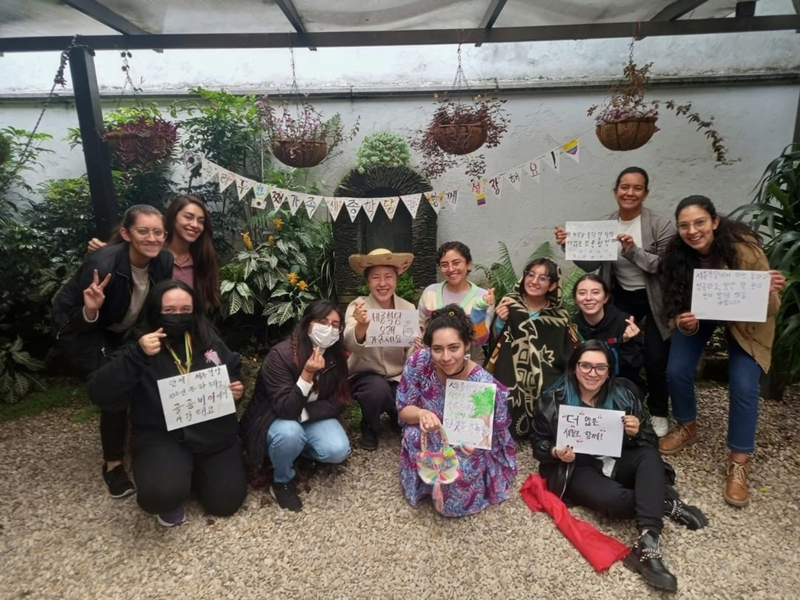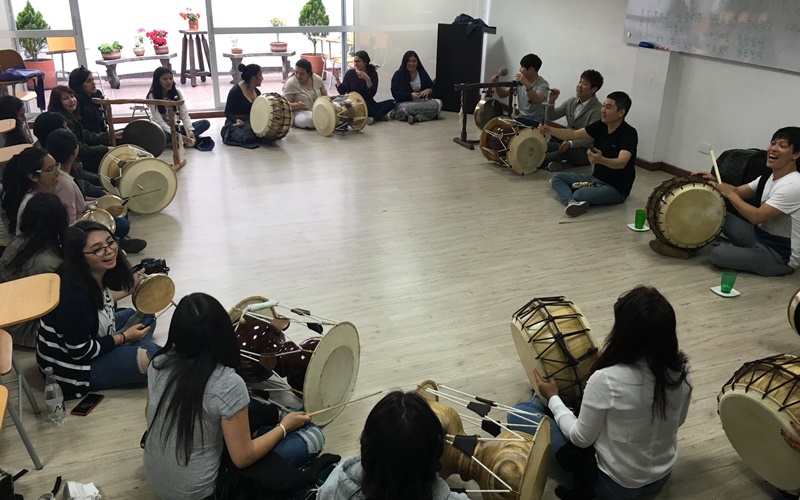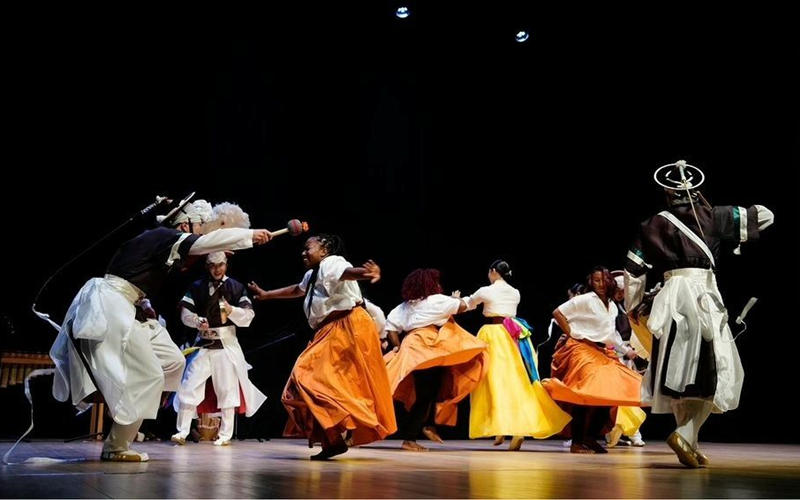- 한국어
- English
- 日本語
- 中文
- العربية
- Español
- Français
- Deutsch
- Pусский
- Tiếng Việt
- Indonesian

Students at King Sejong Institute in Bogota, Colombia, in September 2022 take a group photo to mark the 10th anniversary of the branch while holding papers on which they wrote their wishes in calligraphic Hangeul.
By Hong Angie
Photos = Asia Ibero-America Cultural Foundation
King Sejong Institute (KSI), which teaches the Korean language and culture worldwide, is seeing growing global attention in tandem with the global rise of Hallyu (Korean Wave) and international interest in Korean.
As of June last year, the institute ran 248 branches in 85 countries.
The KSI in Bogota, Colombia, was one of five outstanding branches chosen by the Korean Ministry of Culture, Sports and Tourism and King Sejong Institute Foundation (KSIF) through an evaluation released on Jan. 9 of the management of such branches last year.
The honored center was lauded not only for its Korean-language education, but also for active exchange and cooperation with Colombia-based organizations to boost bilateral relations and development of outstanding learners.
Korea.net on Jan. 19 held a video interview with Yang Samil, president of the Asia Iberoamerica Cultural Foundation and director of the Bogota branch, and the head of the KSI's external cooperation team Shin Kyungeun and program director Cho Jungyoon.
What programs does the KSI in Bogota offer?
Yang: The KSI in Bogota is like a reception room where visitors can learn more deeply not just the Korean language and culture but also Asian culture. We use textbooks, teacher guides, workbooks and mobile apps developed by the KSIF from an intercultural perspective to provide a Korean-language curriculum comprising two beginner levels, two intermediate and one advanced.
Through the Culture Intern program, a KSIF project to spread Korean culture, we also provide interactive programs about certain subjects. The interns are students majoring in Korean culture or arts sent to KSIs around the world to teach students after receiving education in Korea. The leading example of this at the KSI in Bogota is Hanbia, a samulnori (traditional percussion music) club that receives guidance every time the interns visit Colombia.
Cho: We set up preparatory courses for TOPIK (Test of Proficiency in Korean) for students seeking to take the test for specific purposes like studying or working in Korea. Our institute was launched in 2012 with 27 students of Korean, and that figure jumped to about 500 as of last year. Our Korean culture programs have over 1,000 students including not only KSI students but the public.

The KSI in Bogota, Colombia, runs interactive programs through Culture Intern, a project designed by the King Sejong Institute Foundation to spread Korean culture. Shown are participants learning samulnori (traditional percussion music).
What do Colombians find most interesting and difficult when studying Korean?
Shin: They are most interested in learning Korean culture and customs because if they learn the Korean language, they come to understand Korea's unique cultural expressions and customs in K-dramas or movies. On the other hand, they say pronunciation is the most difficult. They get confused in the process of learning Korean because its pronunciation and notations are different from those of Spanish. What Colombians commonly find hard are double consonants and double vowels.
What makes the KSI in Bogota stand out?
Yang: Since it was opened in 2012 to form friendly connections between Korea and Colombia, the branch has actively communicated and cooperated with leading institutions in Colombia like corporations, universities, local governments and public offices. Along with the PNC (National Police of Colombia), the KSI in Bogota since 2012 has provided education on arts and the Korean language and culture for communication between residents of conflict territories and police. Through this, we've improved the lives of underprivileged youth such as sex workers, model inmates at juvenile detention centers and orphans.
This also contributed to the professionalization and globalization of Colombian police through education on the arts and the Korean language and culture. Our institute on Dec. 10, 2019, was recognized for our contributions to the development of civic society and police development there by receiving the Order of Educational Merit, the highest honor awarded by the PNC.
We have exchange programs with 26 Colombian universities and several in Korea (including Korea National University of Arts). Through our business agreement with ITM (Metropolitan Institute of Technology) signed in 2022, we are introducing diverse facets of Korean culture to Colombian society through allowing ITM faculty members and students to conduct exchanges with Korea.
What exchange projects and cultural events are you running in Colombia?
Yang: We invite Korean arts troupes like the Korean National Ballet and Korea National Contemporary Dance Company to perform at international events. We operated on April 19, 2022, a promotional exhibition hall to commemorate the 10th anniversary of the Bogota branch at the 35th Bogota International Book Fair and presented a variety of programs like those on traditional Korean culture and literature, seminars and concerts.

The KSI in Bogota, Colombia, invites Korean arts troupes like the Korean National Ballet and Korea National Contemporary Dance Company to perform at international events. Shown are artists from the Casa Tumaco Foundation in Medellin, Colombia, and Korea National University of Arts on Sept. 8, 2023, putting on a performance integrating Korean and Colombian culture at Auditorio Mario La Serna (Mario La Serna Auditorium) of Universidad de Los Andes (University of Los Andes) in Bogota.
What are the KSI in Bogota's goals for 2024?
Yang: We plan to open the first Korean Culture Innovation Center in Latin America at ITM. In addition to Korean-language education, we will spread Korean culture to other regions instead of just focusing on the capital of Bogota through exchange projects and Korea-related events. We will also boost agreements with local governments so that Korean-language learners can take part in activities related to Korea.
shong9412@korea.kr